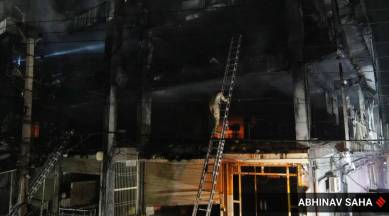Stay updated with the latest - Click here to follow us on Instagram
Mundka fire: Bodies charred beyond recognition, forensic lab has tough task at hand
So far, only eight out of the 27 bodies have been identified and the rest are not just “highly charred”, but also have no jewellery or clothes that can help with identification.

The Forensic Science Laboratory in Delhi has collected DNA samples from 27 bodies – most of them charred beyond recognition – since the Mundka fire, and is now in the process of matching those with blood samples collected from family members. So far, only eight out of the 27 bodies have been identified and the rest are not just “highly charred”, but also have no jewellery or clothes that can help with identification.
The fire broke out at a four-storey commercial building in Outer Delhi’s Mundka on Friday, killing 27 persons, most of them women. The next day, families were called to the mortuary to try and identify their loved ones. The eight – Tania Chauhan, Ranju Devi, Amit Jyani, Kailash Jyani, Drishti, Yashoda Devi, Vishal and Mohini – were identified with the help of their clothes or pieces of jewellery such as bracelet, gold chain or earrings, said their families.
Officials on Monday said DNA testing and profiling can take days or even weeks because of the number of the test samples and the lengthy procedure.
Deepa Verma, the director at FSL Rohini, said, “Seeing the gravity of the situation, we expedited the process and have already collected all samples, including blood samples of family members, for DNA testing. The process could take some time because the biological tests are done individually in labs and then we have to match the DNA recovered from the families. Also, some tests are repeated to re-confirm the reports.”
Police said they submitted samples of all 27 bodies – including even those identified – to reconfirm and make sure there was no misidentification.
In the case of bodies in such a condition, officials say they first look for any skin or muscle grafts. If that is not available, teeth or bone samples are collected.
“It’s ideal if some part of the skin or muscle tissue is available for testing. It’s easier to perform tests on such samples. Otherwise, we will have to look for teeth and bone tissues for the tests. This can take some time as extraction isn’t easy,” said an officer.
Lab experts said many of the deceased don’t have immediate family members who can give blood samples, which poses a challenge for DNA testing.
“In many cases, we had to take blood samples from uncles, aunts or cousins. The DNA won’t completely match but major elements will. In such cases, we re-run tests to confirm the results,” said the officer.
Sameer Sharma, DCP (Outer), said police are working closely with forensic experts. “We have sent all samples in time and identified the gender of nearly a dozen bodies. Soon, DNA tests will be performed and results will come out,” he said.